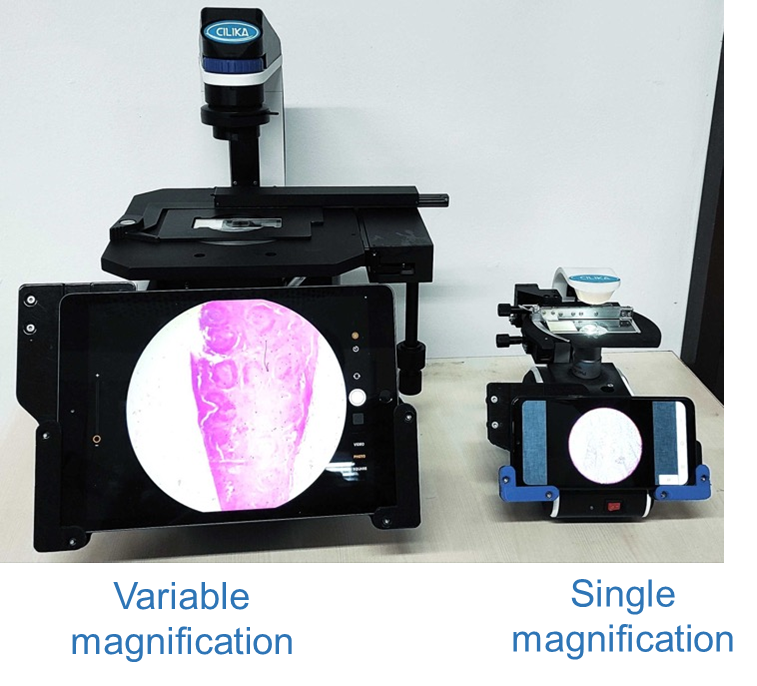Digital Inverted Bright Field Microscopes With Single And Variable Magnifications
A novel line of portable, digital inverted bright-field microscopes has been developed, addressing the need for accessible and affordable microscopy solutions. These microscopes are available in single and variable magnification configurations, catering to various applications. They feature detachable digital displays (tablet or mobile phone) for easy image viewing, capture, and sharing and are powered by rechargeable batteries for prolonged operation. The ergonomic design ensures user comfort during extended use, and custom application software facilitates image analysis and measurements. These microscopes cater to diverse sectors, including healthcare, education, and research, by providing high-quality imaging capabilities for slide-mounted and liquid samples. Their portability and telemedicine capabilities extend their reach to remote areas and empower smaller labs with on-site diagnostic capabilities.
The healthcare sector faces significant challenges, particularly in remote and rural areas, due to the lack of microscopy facilities and trained technicians at sample collection points. This often necessitates transporting samples from tier 2/3/4 cities to tier 1 cities for analysis, leading to delayed treatment and increased costs. Additionally, there is a shortage of affordable inverted microscopes for imaging liquid clinical samples in IVF labs, pathology labs handling cell cultures, and pharmaceutical companies developing drugs. In research and education, most universities and colleges in India cannot afford high-quality research microscopes, and conventional microscopes do not allow projecting images directly to show the entire class. This underscores the need for a novel inverted microscope design that addresses these limitations.
Features of the variable-magnification microscope:
- Quadruple nose-piece
- Infinity-plan objectives: 4X 0.1 NA, 10X 0.25 NA, 40X 0.65 NA, and 100X 1.25 NA (oil immersion).
- Detachable 10.2” tablet (iOS) as digital display
- 20 FN field of view. 100% of the field-of-view is captured through a tablet camera (TrueView Technology)
- Coarse and fine (0.2 mm/rotation) focus knobs
- 210 mm X 241 mm sample stage; XY travel distance: 128 mm X 80 mm
Features of the single-magnification microscope:
- Single nose-piece. The photo shows a 40X (0.65 NA) infinity plan objective.
- Can provide other objectives.
- A detachable mobile phone is provided. The holder can be customized to any mobile phone with the main back camera placed on one side (e.g., Samsung A12)
- The complete portable and robust design was validated through field studies in sickle cell screening camps held at Valsad, Dahanu, and Nagpur.
- Inverted, portable, bright-field microscopes for imaging slides and liquid samples
- Detachable digital display
- Battery-powered (Li-ion; 5200 mAh) for 7 – 12 h operation.
- Charging port (110V – 220V) for emergencies.
- Ergonomic design for long working hours
- Custom application software (Cilika) for easy image capture and micrometry.
- It supports telemedicine (to address the lack of trained technicians), large classroom teaching, and community education for public health.
This line of microscopes can significantly impact society by empowering small pathology labs, which currently function merely as collection centers, to conduct basic microscopy tests at the point of collection. This capability can reduce sample loss and accelerate diagnosis and treatment. Additionally, these digital microscopes facilitate image sharing and telepathology consultations in regions with a shortage of doctors, improving healthcare access and quality. Notably, the single-magnification microscope has been extensively utilized for diagnosing sickle cell disease in various rural areas of Gujarat and Maharashtra, demonstrating its effectiveness in enhancing medical services in underserved communities.
This line of digital microscopes meets the demand for high-quality indigenous inverted microscopes in various settings, including research labs (such as tissue culture microscopes) in universities and colleges, educational institutions serving large class sizes, pathology labs in tier 2/3/4 cities for basic hematology examinations and initial tests for bacterial, fungal, and parasitic infections, and IVF labs. The global microscopy market, valued at USD 6.5 billion in 2020, is projected to reach USD 8 billion by 2026.

